The idea of a Boycott is an Irish invention. During the Land Wars in 1880, when Colonel Boycott on behalf of Lord Erne unscrupulously evicted tenants who didn’t pay rent following a bad harvest, no one moved in to rent the vacant farms. Everyone refused to talk to Boycott. He was ostracised completely. The tactic worked so well that within months the Times of London was talking about Boycotts as a form of protest. A new non-violent form of resistance was born.
As outlined in Witty A: Report to the President, the structure and functions of company boards means that the only thing a Pharmaceutical Company behaving egregiously has ever listened to has been a Boycott.
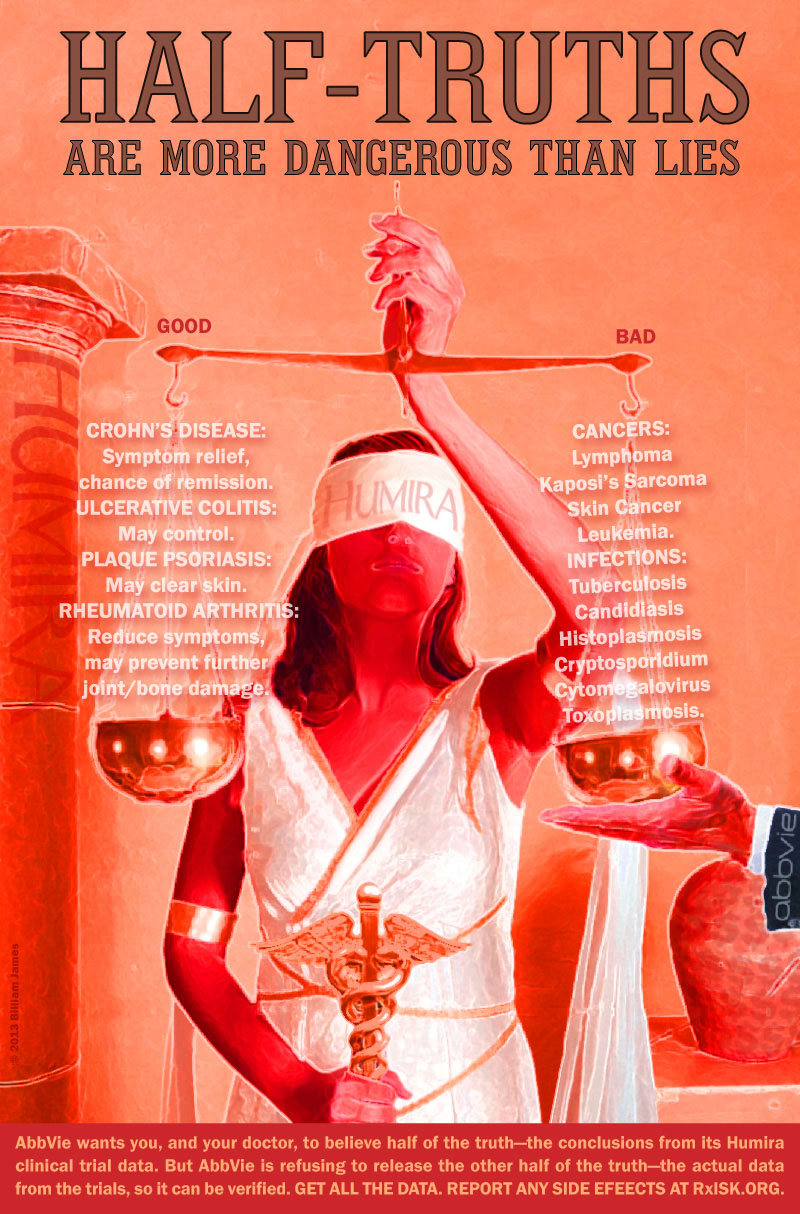
AbbVieing is the opposite of boycotting
It’s time for another invention – the AbbVie. AbbVieing is named after the pharmaceutical company AbbVie (NYSE:ABBV) – the recent spun-off entity of Abbott Laboratories. It is almost the opposite of Boycotting. Far from shunning and not mentioning AbbVie or their drugs, we call on everyone taking an AbbVie or InterMune drug, listed below, to talk loudly about them by reporting to RxISK.org any side effects they may be having on these medications. We want you to talk about these drugs and to their companies.
We need to AbbVie to undo company AbbVieCating. AbbVieCating is marketing under the banner of science without adhering to the norms of science.
In 2010 Peter Gøtzsche from Copenhagen who took a case for access to clinical trial data to the European ombudsman won a ruling that the European Medicine’s Agency (EMA) should make the data from clinical trials submitted to them for regulatory purposes generally available. This was a wonderful breakthrough. Last November EMA convened meetings to work out the ground rules for what was expected to be the new way of doing things.
This is not a European issue. More Americans applied for data from EMA than anyone else. This is a global issue. Americans and Canadians stand to lose more than anyone if access gets overturned.
In February, a legal action was taken in the European Court against EMA’s data access by two American companies. AbbVie Inc. (NYSE: ABBV) —which is the former medicine’s division of Abbott – and InterMune Inc. (NYSE: ITMN). Other companies like GSK came out offering something sold as transparency but in fact possibly a more devious form of AbbVieCation. (C-389/13 P, EMA v. AbbVie, C-390/13 P, EMA v. InterMune U.K. and Others).
The risks to patients and science were so high that in a post at the end of April, Brand Fascism, I suggested we might be better off if access to trial data was blocked – at least that way we might more easily be able to see what we are up against. The same day the European Court issued an interim judgement, in favor of AbbVie and InterMune, suspending data access. (This decision was appealed July 5 by EMA).
AbbVie applied to block access to two clinical study reports that focused on the safety and efficacy of their blockbuster Humira, responsible for 70% of the company’s profits. The reports were on its use for the treatment of Crohn’s disease. Another clinical study report concerned safety risks linked to combinations of Humira and corticosteroids. This is an AbbViecation from scientific norms. Just as Roche did with Tamiflu, AbbVie expects to be able to get insurance companies and governments to cough up huge amounts of money supposedly because the science shows a favorable risk benefit ratio – when in fact they want the data buried where the sun don’t shine.
In InterMune’s case, the company took issue with disclosure of data on its new drug Esbriet, an anti-inflammatory drug it hopes to push for the treatment of a lethal – largely drug induced condition – idiopathic pulmonary fibrosis. Esbriet might weirdly become the first drug to become a blockbuster out of managing an adverse effect caused by other drugs.
A breach of privacy?
AbbVie and InterMune have claimed that the decision to provide access to all non-clinical and clinical data violates their ‘fundamental right to the protection of confidential commercial information’, and their ‘legitimate expectations’, and copyrights they hold. The bottom line is company rights to privacy are being breached.
There was widespread dismay when the interim ruling of the Court supported the companies and when access to clinical trial data was suspended – at least temporarily.
The final ruling from the European Court will take time – months perhaps longer. The pharmaceutical manufacturers associations of the US and Europe have weighed in in support of the companies. The forces arguing for access have far less fire-power or resources. Few if any have the resources or legal standing to participate in this case. But there is something that everyone reading this post can do. You can AbbVie.
How to AbbVie: Step 1
If you are taking, or know anyone who is on:
- Humira
- Depakote (another AbbVie drug, for which the company was fined $1.3 Billion for mismarketing).
- Kaletra (for HIV/AIDs)
- Androgel for low Testosterone
- Lupron used for prostate cancer, breast cancer and endometriosis
- Esbriet
Report any events happening on these drugs to RxISK.org by clicking on the name of the drug. This will take you to the research pages for the drug. The drug name will be automatically entered when you click on Report a Drug Side Effect from the research pages. An exception is for Androgel which needs to be entered manually and for which there is no research pages yet. For Androgel, you will be taken directly to the reporting page.
Disease mongering & successful marketing
Humira, adalimumab, is a Monoclonal Antibody (MAB) used for the treatment of arthritis, Crohn’s disease and other auto-immune conditions. This and other “MABs” and “biologicals” such as Remicade, Enbrel, Erbitux, Prolia, Simponi, Tysabri, Herceptin and others can be wonderful and life transforming for sufferers of Rheumatoid Arthritis, Crohn’s Disease and other conditions, including some cancers.
These are medicines we need. But as with disease mongering for less important medicines, the companies producing MABs have been very good at producing advertisements showing fit young men who might have a back twinge at the end of a game of squash, planting the suggestion that this might be ankylosing spondylitis, and you just ask your doctor. None better at marketing than AbbVie.
The marketing has been so good that in many places this drug has become the frontline treatment for rheumatoid arthritis or Crohn’s disease – with young patients ending up on it rather than looking to lifestyle approaches or trying safer drugs after their very first clinic visit.
The rub is safety. Just like AIDS, Humira can affect the immune system and can activate dormant infections like Tuberculosis, Candidiasis, Histoplasmosis, Cryptosporidium, Cytomegalovirus, Toxoplasmosis – names last heard with any frequency in the early days of the HIV epidemic. Humira and other MABs can cause a range of cancers including lymphomas and the cancer that AIDs made famous – Kaposi’s sarcoma.
- Go into RxISK.org, enter Humira, and look under the Reported Side effects tab.
- The Tag Clouds for Humira at the bottom of this post – come up under the Frequency and Severity tab.
- All the side effects including Kaposi’s Sarcoma come up under the A-Z Side Effects tab.
- Using the Location tab you can see where these come from.
How AbbVieCation affects you
There are many of us with bad Rheumatoid Arthritis or Crohn’s Disease who would gladly take these risks, especially if the drug produced a real benefit. We might be much less inclined to do for milder conditions. But in all cases the trade-off should be ours. Ideally we should be helped by our doctors and pharmacists, but doctors and pharmacists who truly know what the problems can be.
When AbbVie hide their clinical trial data, they make anyone who was involved in a clinical trial of their drug or a doctor prescribing it or pharmacist dispensing it into a potential accomplice to injury and perhaps homicide because the missing data is used to argue that ‘we’ve done trials and look there is no risk’.
There are more ways to establish whether drugs cause a problem than through clinical trials. We can put on the map what it is that AbbVie and InterMune are seeking to hide. If we mobilize quickly we might be able to provide data that the European Court will be forced to take into account.
AbbVieing is the opposite to Boycotting. We want you to pay close attention to these drugs – shine a spotlight on them – and communicate with them and each other rather than shun them. Step up as AIDs activists once did and ask the company ‘Can We Talk’.
If you are part of a patient organization dealing with Crohn’s Disease or Ulcerative Colitis, Arthritis, Psoriasis, Multiple Sclerosis or other conditions you may be able to spread the word rapidly and mobilize many people.
A good medicine is a chemical plus good information
Unlike the tenant farmers who had to endure the hardship of not earning a living off Boycott’s farms, doing the AbbVie will not hamper your treatment or access to treatment in any way. Just the opposite – it will improve your treatment. A good medicine is a chemical plus good information. AbbVie want to degrade the quality of your medicine in particular and all our medicines in general. We need to help them have better medicines – despite themselves.
How to AbbVie: Step 2
- To AbbVie, go into RxISK.org.
- File a report on any adverse events you have had on treatment on these or other Biologicals.
- If possible outline the economic impact of these events.
- Generate a RxISK Report and take it to your doctor or pharmacist.
Letting your doctor know this is about two things. One is is about an adverse event you may be having on treatment that you want help with. The second is about company behavior that she more than anyone else is well placed to influence. She can do this by adding to your report and filing reports on other patients she sees or encouraging them to file reports.
As soon as reports come in to us, we will create HeatMaps showing where the reports are coming from and this may help generate media stories that will put a campaign on the map. We will post these HeatMaps at regular intervals and at all times the data will be available for free
Wherever you come from write anywhere on your RxISK report or email us if you want us to include your name in a petition we will make available to Guido Rasi, Executive Director of the European Medicines Agency, supporting him in his action to get the Court to uphold the ruling of the European Ombudsman that there should be access to clinical trial data. The Adverse Effects are the most global issue in healthcare, and companies are doing all they can to silo countries off from each other. We need a global response.
Humira heatmap
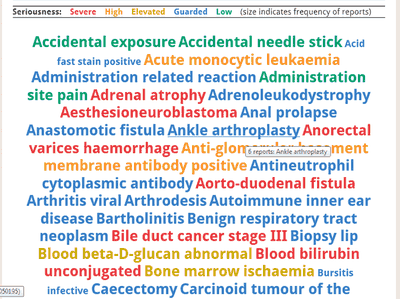
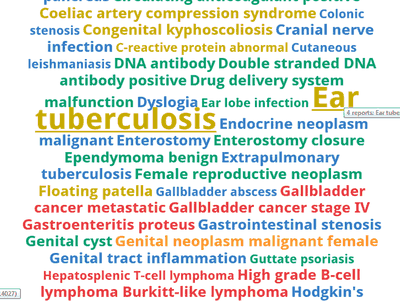
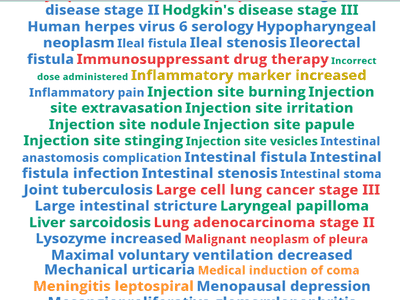
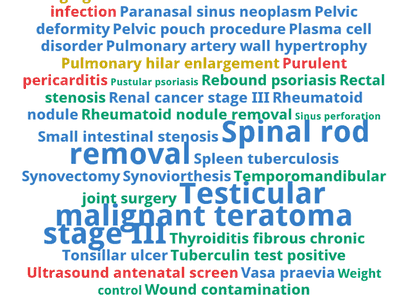
Illustration: Humira: Half-Truths, © 2013 created by Billiam James
janet williams (@JanetWilliams99)
15/07/2013 10:22
@DrDavidHealy The guilt experienced by mums on #epilim when their child has #facssyndrome is traumatic. Women need informed choice.
Epilim is Depakote – an AbbVie drug – all women who have children with fetal-anticonvulsant syndrome should make their voices heard – there are thousands of children who have been affectedpingr
Could you please tell me which is the rx form i need to fill in
Many Thanks
Jane
Jane
You go to RxISK.org and fill up a form outlining any side effects you had on the treatment you are on. This will give you a RxISK report that you can take to your doctor or pharmacist if your problem is a current one to help them help you minimise or stop the problem. If its a past problem, you might encourage them to report also – to add their voice to confirm yours.
While on RxISK you can also research any drugs you are on and see what problems have been reported to FDA on your drug and where the reports have come from. You might be surprised what has been reported and might in fact find you have been having things happen to you that you weren’t aware stem from the treatment
DH
From: lesley.kay@newcastle.ac.uk
Date: 16 July 2013 21:50
To: EVIDENCE-BASED-HEALTH@jiscmail.ac.uk
I agree that these side effects can happen. They are uncommon, though, and the benefits are not to be belittled. In the uk it can only be used where other drugs have failed, and we have registers (one for RA, one for psoriasis and one for ankylosing spondylitis) where doctors, nurses and patients (independently) can report side effects.
I share your scepticism about the behaviour of drug companies in reporting all of their trial results, but honestly we have seen some patients really helped by these drugs when nothing else has worked.
Declaration: I am a rheumatologist, am involved in the Bsr biologics register for AS and have in the distant past (>3y) been paid to give educational talks by Abbott. And I really care about being able to treat patients with the most appropriate drugs, and helping them to judge risks and benefits of treatments.
Lesley
I realize there are patients out there with truly severe symptoms and no easy choices, for whom these drugs may be their best bet. But patients have a right to know what risks we are taking, and make decisions on that basis. And AbbVie in effect is fighting to keep us in the dark. At best they want to give vague advisories to our doctors, who will be left to puzzle out when “the benefits exceed the risks” without knowing exactly what the risks are – and will be left to take the blame when things go wrong.
Meanwhile they are aggressively pushing Humira as a first-line treatment option for AS and RA, and even urging people with “nagging backache” to ask their doctor if it could be AS. I took the AS quiz they posted on http://www.faceyourbackpain.com and passed with flying colors – even though my back pain is mild and there’s not a snowball’s chance in hell I have AS. Young patients in particular are lured to consider these drugs for frustrating symptoms that are “holding you back” even if they’re nowhere near disabling. Some are told that taking these drugs early on (rather than trying other drugs first) can prevent future joint damage. Young Crohn’s patients are being counseled to take these drugs for life, although nobody seems to know how that will pan out. And fit young people with embarrassing psoriasis lesions are beckoned with ads that promise “Clearer Skin Is Possible.”
It’s good to know the NHS imposes some restraints on prescribing these drugs. I only wish that were true in the US. I hope you’ll stay vigilant – and don’t let the free-market zombies devour your health care system! They are out there licking their chops for sure.
“but honestly we have seen some patients really helped by these drugs when nothing else has worked”
From what I have read this is a common misunderstanding with healthcare professionals when it comes to subjects like AbbVie vs EMA or antidepressants, or or even the purpose of rxisk. I hear this ‘some people are really helped” argument time and time again as if its relevant. As if asking for all the data will somehow harm these people.
Even a drug that normally does much more harm than good can be of great help to some people in certain circumstances, but for that to happen effectively then surely the more data the better? Isn’t that the point this whole transparency debate? Isn’t that the point of rxisk?
Some people being helped does not wipe out the harm caused to others or make the lack of transparency and resulting dodging of responsibility ok.
Even if it looks like the drug is helping everyone you treat the situation highlighted here should not be ok with you. It should not be ok if you care about giving the best possible care to patients and it should not be ok if you are trying to decide how to spend taxpayer money. The only place it seems to be ok is in the boardroom which says it all really.
My wife’s CPN to this day would say that Effexor really helped us, even though it nearly destroyed our lives and put my wife on a course of self-destruction. I am certain she fully believes what she is saying, she seems utterly blinkered when it comes to the real risk of harm that comes with these chemicals. When I told her that my wife had a major change in personality she said something very similar to Lesley above…”that side effect can happen but it is very uncommon” followed by…”and I doubt that’s what is happening in this case”.
“…but honestly we have seen some patients really helped by these drugs when nothing else has worked.”
“some patients”. Good for them. These drugs are supposed to have one and only effect: heal diseases.
Isn’t it what we are being told?
It is amazing that expensive drugs that are on the market to, ok. “help” people have to have doctors, some payed buy the labs, claiming that “they help people”.
I have already read numerous times: “These drugs have been helping millions of people….” back in 2007, 2008-2010 when I was participating in discussions on blogs and sites that are raising awareness about the other millions of people who have been suffering the hell on these drugs.
The side effects reaches areas that people feel ashame to talk: “I almost killed myself”; “I’m sexually castrated.” and so on…
These are crimes against humanity and this will be in history as the darkest age of medicine, especially psychiatry which already has on it’s curriculum helping torturing people in totalitarian regimes and other crimes.
How can a psychiatrist prescribe a drug that induce suicide without alerting the patient? “You will lose your sexual function if you take this drug for a long time.”
Do they say it?
“No. This is not a side effect! My other patients do NOT have this problem.” “It’s all in your head.”
This is what psychiatrist tell their patients.
Psychiatrists have been prescribing these drugs for more than twenty years and few are reporting the truth.
I lost all respect for medicine and psychiatry in particular. The mental institution in front of my building is a source of constant horror stories.
Is it because I live in a third world country? No. This hospital receives researches from Europe because it is considered a center of excellence.
Of course they are not informed that there are drug dealers that sell cocaine for people who are there treating the addiction.
They get out of the hospital with Zyprexa at one pocket and cocaine at the other.
The Zyprexa is being used to easy the down when the cocaine stop working.
They do clinical trials without informing the patient.
There are stories told by former employees of… rape. Patients are being rape by… guess who?
Is it an isolated case? NO! Mental institutions are the same all over the world.
And psychiatrists remain… silent.
“My wife’s CPN to this day would say that Effexor really helped us, even though it nearly destroyed our lives and put my wife on a course of self-destruction…”
I have read it numerous times. “This drug destroyed my body, mind and soul.”
“This drug destroyed my life.”
I also have the experience with Effexor. It destroyed my life.
I know exactly what you mean.
But we are the exceptions.
“This drug has been helping billions of people.”
I took Lupron in 1997 for IVF ….it ruined my life….I still am in pain 24/7 I was poisoned ..
Ana how do you know you are the exception?
A bit stunned at the moment.
I was aware of the strategic maneuver by Abbott to dump the liability into AbbVie because I was a former employee. This is the first I’m reading of “AbbVieing” and trying to wrap my head around it.
There’s a special place in hell for those both harmed and having had a role in harming others, even unknowingly. Drank the Koolaid. Sold the Koolaid.
Permanently disabled by Zoloft (neuromuscular / movement disorders) while working for Abbott, in Neuroscience the last several years promoting Depakote in psychiatry and working with researchers at California teaching institutions.
In my last position, I promoted Depakote to nursing homes, a key person in the $1.3 billion qui tam lawsuit filed and won by my territory partner (TJS). Seeing MY OWN documents (dinner events, etc) used as evidence in the federal court documents is SURREAL. I had NO idea it was all happening until years later after I was involuntarily medically retired. The kicker: I’m still receiving AbbVie LTD benefits to survive.
To say “I’m sorry” is the understatement of the century. Knowing all I do now is pure hell compounding the hell of being harmed, disabled, and left with a shell of my previous self.
The guilt and cognitive dissonance are paralyzing.